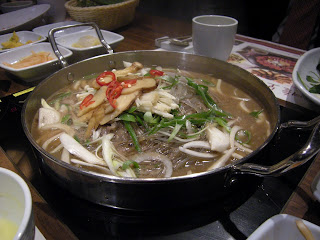What if campaigning only lasted 23 days? That's the system in South Korea, as this man, Kim Yong Hi, General Director of Election Management explained. In South Korea candidates and parties are limited as to when they can run ads and give campaign speeches. Elections officials say 23 days is enough time to reach people in this small country. Even though TV ads and political speeches are restricted, social networking sites are not. Campaign messages on Twitter and Facebook can run anytime but the information in them has to be true or they might be removed.
If there was a theme today it would be food. Both lunch and dinner had at least eight courses...way more food than anyone in the group could eat. The top picture is a beef dish with noodles, and the other one is a very spicy dish with an egg on top. I know this isn't very descriptive, but I wasn't sure what I was eating or how to spell it.
The highest ranking official we met with today was the man on the right, Bark Taeho, the Minister for Trade. He was instrumental in the new US-South Korea Free Trade Agreement. For Americans this should translate into cheaper smartphones, TVs, and even canned ginseng chicken soup. Bark is working on a Free Trade Agreement with China now. The next round of negotiations is scheduled for July. Below is the view from another building where we talked trade.
This hazy picture comes from the World Trade Center in Seoul where we heard from Choi Yong Min, Director of FTA and Trade Issues Department. His private organization-the Korean International Trade Association, the biggest trade association in the world, represents 70,000 businesses. The businesses and the government are trying to be more environmentally responsible. Choi says "Green Growth" is the slogan of the administration with a lot of investment in this area. As an example, a subsidiary of the Pohang Iron and Steel Company (POSCO) has developed a technology called Finex to reduce emissions. According to its website, Finex is a smelting-reduction technology based on direct use of fine iron ore and non-coking coal. It doesn't use furnances. The technology has reportedly reduced pollution and lowered costs.
Check out the NPR hat. I gave it to Suk-Ho Shin after his talk on North Korea. He is a reporter for South Korea's largest Newspaper, DONG-A-ILBO, and covers North Korea even though he hasn't been allowed in, in years. This December he will become the paper's Washington D.C. based correspondant.






No comments:
Post a Comment